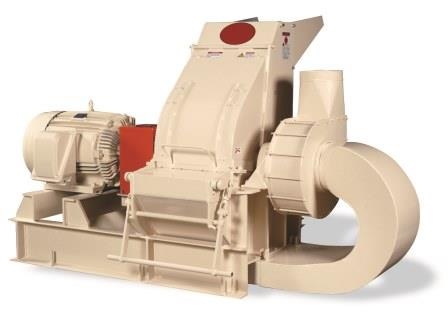University Research Center Adds Hammer Mills, Broadens Biomass Testing Scope
October 16, 2014

The Herty Advanced Materials Development Center of Georgia Southern University has been a world-class applied research facility for over 75 years. For decades, its clients have honed developing technologies, validating their process and product concepts in Herty’s laboratory. Headed by Dr. Omar Ali, Herty’s BioProducts Div. has been at the forefront of many innovations in the processing of biomass. Serving as a hub for pre-commercial process and product testing, the Herty lab allows clients to develop technology suitable for commercial implementation before making a capital investment. A recent purchase of two hammer mills from Buffalo, NY-based manufacturer, Schutte-Buffalo Hammermill LLC will take Herty’s pilot scale pellet line and biomass conversion capabilities to the next level.
Increased Feedstock Demand
The domestic and international demand for biomass pellets derived from renewable sources continues to rise. The International Energy Agency estimates that global demand for energy pellets increased 110% to 13.5M tons between 2006 and 2010, and is projected to further increase to 35M by 2020. This increased demand will require that biofuel producers continue to seek out new feedstocks, including high moisture content materials such as green wood. The addition of the two hammer mills to Herty’s lab will address challenges commonly faced when processing high moisture content materials for biofuel feedstock by enabling size reduction both before and after the drying process.
“Having this flexibility in size reduction capabilities will be a big plus for Herty and in the ability to serve our clients and support our ongoing research programs,” said Dr. Ali.
Innovative Size Reduction
Schutte-Buffalo Hammermill LLC has been designing and manufacturing custom size reduction equipment for more than 80 years. In the past decade, the company has worked extensively with producers of a wide variety of biofuels, and as a result has become well versed in the common challenges of processing green wood and other high moisture content biomass materials.
“We have supplied our equipment to many of the largest wood pellet plants in North America, and we have developed technologies that are unsurpassed in performance,” said Tom Warne, president & CEO of Schutte- Buffalo Hammermill LLC. “Our smaller mills - such as those supplied to Herty - feature these same technologies. Therefore, the results achieved in Herty’s pilot facility can be easily and accurately scaled up to any production level.”
Optimal feedstock for energy pellets has a moisture content of less than 10%, and a consistent finished particle size of ¼ in. or less. However, by definition, “green” biomass has a moisture content that can be greater than 50%. Therefore, for green biomass to be used as feedstock, it must first be dried. The challenge becomes how to do so in the most efficient and cost effective way. As a result, the engineering team has determined that a two-phase size reduction process (i.e. one hammer mill before and one after the dryer) is the best approach to efficiently addressing the challenges posed by green biomass.
The installation at Herty will feature two hammer mills, custom configured for processing biomass materials. The first, a Model 1320 gravity discharge mill, will pre-grind the green material to a consistent ½- to 1-in. finished particle size, at a rate of well over 1 tn/hr. Once the pre-ground material is dried to a moisture content of <10%, it will be fed into the second mill, a Model 1360 pneumatic discharge hammer mill, where it will be further reduced to the exact finished particle size required at the rate of 1 tn/hr. The pneumatic evacuation on the finish grinding hammer mill maintains processing efficiency by “pulling” the material through the hammer mill screen and then conveying it to the next phase of the process following size reduction.
Broader Capabilities
The addition of the hammer mills to the Herty laboratory will allow enhanced biomass resizing, thereby extending the processing capabilities for pellet production and biomass conversion.
“Biomass Processing is a key component in the production of a wide range of products including energy pellets, bio-based chemicals, and advanced biofuels,” said Dr. Alexander A. Koukoulas, president & CEO of Herty. “The added capabilities this equipment brings to Herty will make us second-to-none in our ability to process biomass and support the development of the bio-based economy.”
For related articles, news, and equipment reviews, visit our Equipment Zones
You May Also Like


